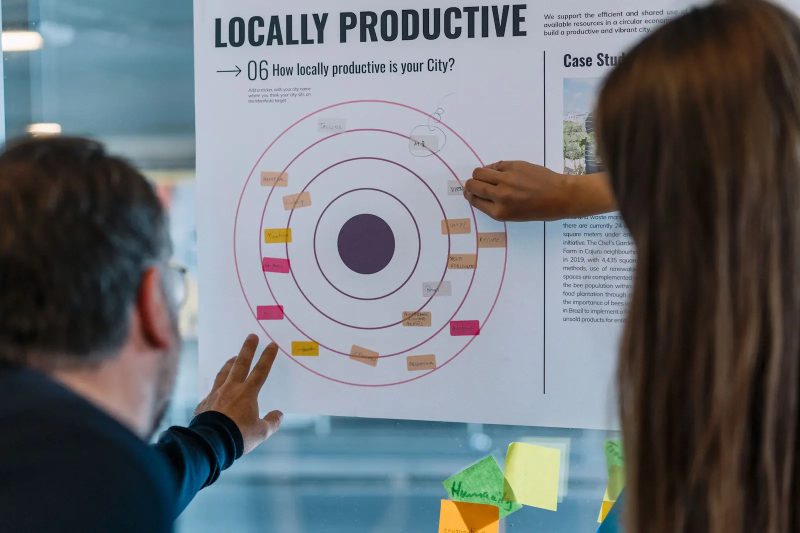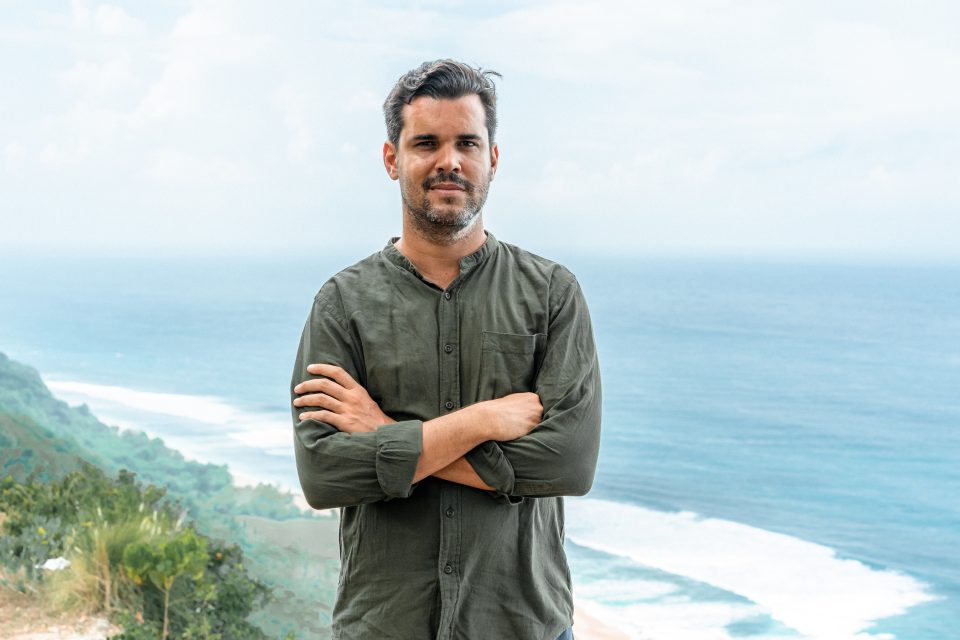An interview with Tomas Diez by Seven Stones Indonesia.
Tell us a little about yourself, Tomas. Where are you from and how long have you been living in Indonesia?
I have a mixed background. I’m mostly Venezuelan, but also Spanish. I’m an Urban Designer, but also a technologist. And like many people, I consider myself someone with a hybrid profile, both culturally and professionally. I grew up in Venezuela, moved to Barcelona when I was 24 years old, and I’ve been living in Bali since 2020. I felt it was time to come back to tropical life and connect with a new culture.
You’re the man behind Fab City and Fab Labs. What’s the inspiration behind that?
I’m just one of the visible faces, and for some reason have accidentally become a kind of spokesperson for the movement. The truth is that many people make Fab Labs and Fab Cities possible. Fab Labs first started out from the Center for Bits and Atoms at MIT and has been democratising access to digital fabrication in over 100 countries. Fab Cities started about a decade ago, and we launched it in Barcelona with the support of the local Fab Lab, IAAC and the city council. Now there are over 2,300 Fab Labs around the world, and 41 Fab Cities are part of the network.
I’ve been part of helping grow both networks and I’ve also been the instigator of the Fab City movement. I saw the potential of Fab Labs to bring technology closer to people, make it more relevant to their problems, and provide tools and knowledge for anyone to be creative, autonomous, and resilient. I also saw the link to urban design, and how changing the way we produce and consume has the potential to transform radically how we live in cities and towns, which suck resources and produce waste.
 There are Fab Labs all over the world. Why do one here in Bali?
There are Fab Labs all over the world. Why do one here in Bali?
All Fab Labs share the same philosophy, and values as well as similar processes and tools. And thanks to the open knowledge in the network, you never start something from scratch and your project never actually ends. It can become part of a different model of shared development. Bali is an incredible encounter point of culture, which unfortunately has gone too far in a model of extractive tourism and low-value creation. It’s sad to see that the current tourism model only leaves a small amount of money behind as the main gains tend to go to international conglomerates investing locally. It’s happening in Barcelona too.
As an island, Bali is a perfect place to develop local production capacity, so we can talk about a local Fab Lab supporting the development of a local economy based on local production. To do that, we have to develop the skills, knowledge, and capacity for local creators and entrepreneurs to have new means to create the products and services of the future they want. So, it’s about creating opportunities.
I believe Fab Labs in Bali can be a place to connect local and global knowledge, tradition and technology, crafts and new tools. I have to be clear that it’s not me founding or creating a Fab Lab in Bali – what’s happening is that we will see the emergence of Fab Labs thanks to the alignment of a series of key local and international players, and this is being accelerated thanks to the event we’re organising in October called Bali Fab Fest.
What do you enjoy most about it?
It’s a passion. I enjoy making things happen. I co-founded Fab Lab Barcelona and was the director of it for over a decade. Together with an amazing team, we turned it into a reference innovation centre in Europe and globally. What I love most, is making spaces, programmes, events or projects that create the conditions for things to happen, and that are not closed systems themselves. I’ve been part of starting projects like Smart Citizen and organised the global Fab Lab Conference before in 2014. I’m also designing educational programmes, such as the Master in Design for Emergent Futures (IAAC-ELISAVA) and the Master in Design for Distributed Innovation (IAAC-FABCITYFOUNDATION), which I’m both co-directing. All these are aimed at people to become better designers and makers, to produce an impact in the world. I have the same feeling about what we are doing in Bali and the rest of Indonesia. The work we’re developing inside the Meaningful Design Group and CAST Foundation, and the Bali Fab Fest will be a sample of that.
What are Fab Lab’s biggest challenges?
We have a lot of challenges, from the economic sustainability of many labs in the world to the governance model of the network to measuring and demonstrating their impact. While not unique, one challenge that stands out is related to finding sustainable open-source models for hardware development and commercialisation. I hope we don’t replicate the Silicon Valley model, which is predatory, but we do need a competitive ecosystem as well as support, for new businesses to thrive.
What do you think are the biggest challenges facing Bali today? And what are the best solutions to fix them?
I’m no expert, but from my conversation with people, I understand that a key challenge is waste, together with traffic, as well as other issues related to the dependency on tourism and its after-pandemic effect. One big challenge is the abandonment of productive activities such as agriculture or crafts by the younger generations, which is understandable because jobs, like in hospitality, provide better economic returns. I think that shows the signs of a broken system. I also believe that most of these issues are not unique to Bali, and I can identify similarities with Barcelona, as I mentioned before.
For me, the problem itself is the solutionism culture because we believe that there will be a point when we’ll eradicate things completely. The truth is, we’ll always be dealing with problems and challenges, so we need a different mentality, we need to foster creative thinking and innovation in the youngest generations, to be ready to deal with problems and challenges that become more complex as we move forward. For the October event, we’re prototyping this approach to dealing with local problems and challenges, through the Fab Island Challenge, I recommend checking it here: https://challenge.fab.city/
Education, Economy and Sustainability seem to be three core aspects of Fab Labs. Explain why digital/ tech innovations are so important to support these aspects.
 Education is key to enabling a transformation of mindsets. Schools, universities, and institutions need to provide a healthy learning environment to adopt these new skills and knowledge in new ways. The discussion about the economy and sustainability is two sides of the same coin. Economic growth and profits have become even more influential than religion, or the common good. We’ve seen how companies have depleted natural resources to increase production, or how the conditions of workers are worse because budget cuts need to prioritise balance sheets. This is not sustainable because both the environment and the social structures that make us humans are being destroyed, and they have a limit.
Education is key to enabling a transformation of mindsets. Schools, universities, and institutions need to provide a healthy learning environment to adopt these new skills and knowledge in new ways. The discussion about the economy and sustainability is two sides of the same coin. Economic growth and profits have become even more influential than religion, or the common good. We’ve seen how companies have depleted natural resources to increase production, or how the conditions of workers are worse because budget cuts need to prioritise balance sheets. This is not sustainable because both the environment and the social structures that make us humans are being destroyed, and they have a limit.
I also believe that the discussion about sustainability needs to evolve to a new level. What do we want to sustain? For whom? I prefer to talk about regeneration and distribution – something I deeply share with one of our speakers for the Bali Fab Fest, Kate Raworth, who talks about Doughnut Economics. We need to look at the economy to be at the service of the environment and society. Now it’s the other way around and it’s leading us to complete disaster, which we see every day.
What advice would you give to someone looking to invest in Indonesia?
I think that investing in Indonesia might be perceived as setting up a hotel and/ or a restaurant, or any other touristic activity. I encourage people to come to Indonesia to invest in its people and to produce a value of different kinds. I don’t think we need more investors of the type that are thirsty to maximise profits and to make Indonesians serve foreigners coming to resorts. I think this is a great country for impact investment, developing climate technologies, providing remote communities with the right infrastructure to thrive, to invest in the creativity and innovation of Indonesians, which is endless! So yes, I’m calling for people to come and invest in innovation and education in and for Indonesia, with a planetary mindset.
Are you developing any new products?
Depends on what you want to call a product. I design learning programmes, and I’m proud of the Master in Design for Distributed Innovation, which we are doing between IAAC in Barcelona and Fab City Foundation. It’s a programme that uses the planet as a university campus and Fab Labs as the classrooms where people learn about how to innovate with technology to produce local change. I’m really excited about it because it’s going to be the backbone to developing the local talents for Fab Cities, and will help us to identify and support the crazy ones that believe that things need to be different, and who are ready to put the effort in to make things happen.
Where do you see Fab Labs going in the next five years?
This is a very tough question, which would have had a very different answer if you’d asked six months ago, and I’m sure that the world will be a completely different place in another six. For now, I hope that planet earth enters into a carbon-negative phase in five years, as well as a reduction in the global temperature. I also hope we’re not talking about nuclear war, that authoritarian regimes are less powerful, and democracies evolve into something new, more exciting, and inclusive for all. I would love Fab Labs to be part of that process and help communities actively design their own realities, to make them more resilient, but also creative and empowered with technology. Maybe I’m asking too much, but I would love the next five years to be more positive than the last ones.
How can people get in touch with you?
I’m quite reachable in socials as Tomas Diez, you will find me eventually! And you’ll be able to watch the full video of this interview on the Seven Stones Indonesia YouTube channel.
Bali Fab Fest is a 10-day event scheduled to be held from 12th-22nd October at Jimbaran Hub in Bali as the main venue. Go to https://bali.fabevent.org/ for details, the event programme, and tickets.





 There are Fab Labs all over the world. Why do one here in Bali?
There are Fab Labs all over the world. Why do one here in Bali?